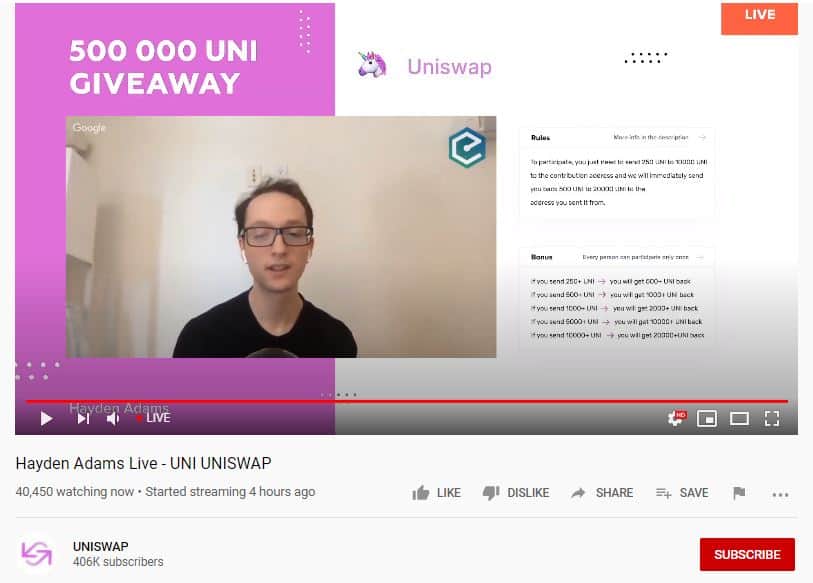Beware: Fake Uniswap (UNI) Token Giveaways Already Roaming the Internet
Cryptocurrency fake giveaway scams continue to emerge frequently, and the latest example involves the popular DEX protocol Uniswap. Just a day following the UNI token release, scammers began promoting fake UNI giveaways by impersonating Uniswap’s creator – Hayden Adams.
Fake UNI Giveaways On YouTube
As CryptoPotato reported yesterday, the popular decentralized token swap platform launched its long-anticipated native token called UNI. The announcement was accompanied by news that Uniswap will airdrop 15% of UNI’s total supply to users who had used it before September 1st. Naturally, this free token rush raised the community’s attention rather rapidly.
However, it appears that scammers were also keeping a close eye. It didn’t take long, and only a day after the UNI launch, unknown fraudsters initiated a fake UNI giveaway on the most widely-used video-sharing platform – YouTube.
In this case, the scammers created a fake Uniswap YouTube channel that supposedly has over 400,000 subscribers. They also launched a live video displaying 40,000 live viewers with the protocol’s creator – Hayden Adams.
Lastly, the classic scam is completed by offering to double all UNI tokens sent to a specific address. Meaning, that if users send 250 UNI to their address, the fraudsters promise to send back 500 UNI tokens.

Although it sounds like easy money, a more in-depth look reveals several issues and points out that it’s a classic scam. The YouTube channel has only two videos – both carrying the same fraudulent live stream, but the Google-owned platform has taken down the first one.
Additionally, the videos contain the same repeating old interview with Adams, where he says nothing about giving free UNI tokens. Last but not least, victims that fall for this scam and actually send coins to the provided addresses will not receive anything in return.
Growing Problem But Where’s The Solution?
Similar fake giveaways are a growing threat for the cryptocurrency field, its image, and, most importantly – users. Although they sound too good to be true, scammers continue doing them on several social media platforms, but mostly on YouTube.
This is where the main problem lies. The Google-owned platform has been previously criticized and even sued for not putting enough effort into fighting the scams. However, YouTube is frequently warning and banning legit cryptocurrency content creators as its logarithm fails to notice the differences.
Another social media giant Twitter also went through something similar recently. Attackers gained control over 130 accounts of famous individuals and companies and initiated a fake Bitcoin giveaway. Although Twitter stayed up front with the users and updated its security protocols, the platform was exploited once again a month later.
In any case, while social media platforms struggle to find the most appropriate solution, users need to be more cautious and vigilant. A general rule of thumb suggests that if something sounds too good to be true, it usually is. Also, there’s no such thing as free lunch.
Click here to start trading on BitMEX and receive 10% discount on fees for 6 months.
